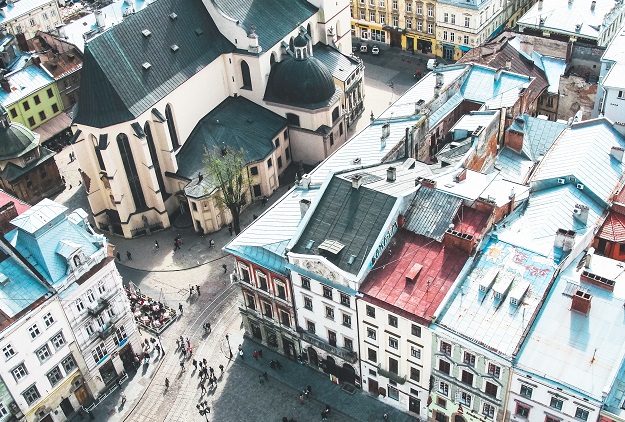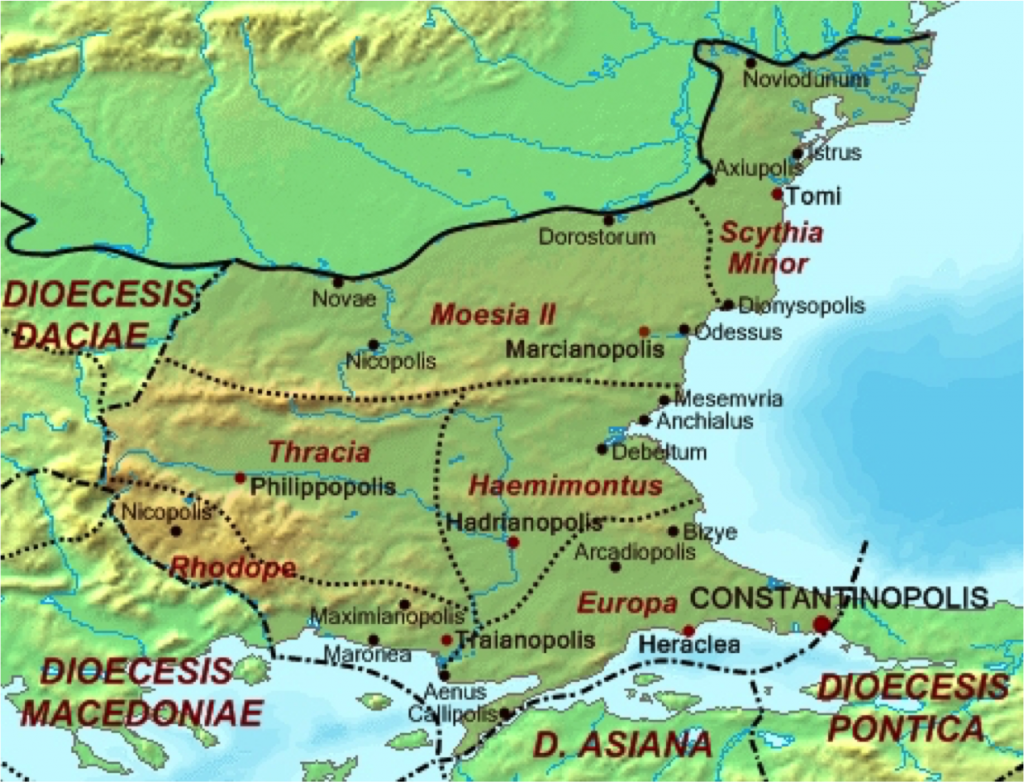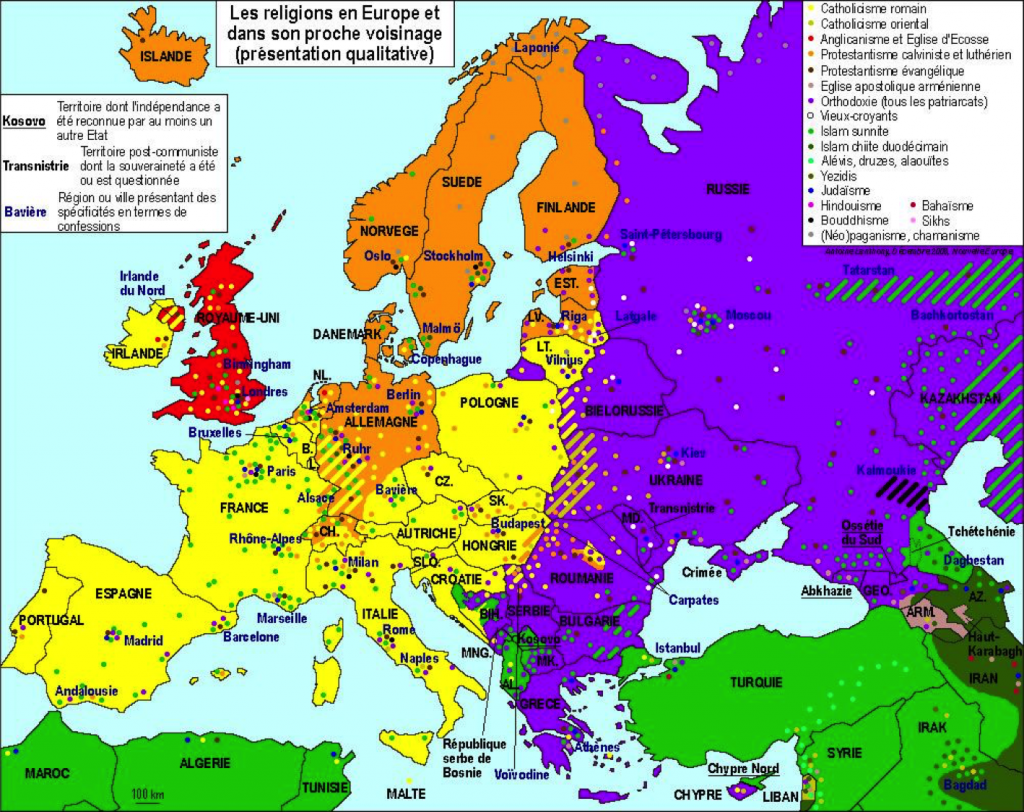The peoples in the east have resisted militant atheism. We, the west, are under another form of atheism which is a sort of political agenda.
 Lviv, Ukraine. / Photo: John Mark Smith (Unsplash, CC)
Lviv, Ukraine. / Photo: John Mark Smith (Unsplash, CC)
There is a tendency in Europe to believe that west is better than east. And the further east one goes, the more there is a reluctance to be called ‘east.’
If you live in France, you have to go east to go to Bucharest. But there, the name used is ‘central Europe’, and that is to say that eastern Europe is farther away. So it is a sense of pushing the east to the east and of not wanting to belong to the east but to the west. Let me give you some perspectives, including historical.
 Map via Schuman Centre for European Studies.
Map via Schuman Centre for European Studies.Here is an old map where there is some of the earliest mentions of Europe. Europe means ‘west’, by opposition with Asia. The Greeks used it to either call their own country Europa or the regions west of it. They situated themselves west of Asia and of the Persian Empire. They had the name Europa because they were not part of the Persian and the Middle Eastern Empires.
Then the name disappeared. The Romans were not interested in Europa. And then the name resurfaces in the 4th century and, apparently, it was used for the diocese of Constantinople, the new capital of the Christianised Roman Empire, the second Rome. Here the name Europa come back again but now linked to the Christian world. Then the name disappeared again. Then in the 7th century the name pops up in the west and in the Latin and Frankish kingdoms, they called themselves Europa, and the Pope crowned Charlemagne as the Father of the Europeans.
Europe means ‘the Christian world.’ It has always been the sense of ‘we are the Europeans.’ It was not a nation, it was not a language, it was not even a territory. It was an idea we belong together and we are Europeans. It is in that sense that Europe comes to existence. The continent of Europe is only defined in the 16th century, so we had the idea before we had the continent. And the continent was, more or less, the Christian world. And as more tribes became Christian, Europe became larger.
Two forms of Europe
But we have, from the beginning, two forms of Europe. The oldest form of Europe is the Byzantine Orthodox one. That’s where it started and we in the west forget it. We think that Europe started with Charlemagne, with the Frankish kingdoms, and with the Frankish and the German empire. And in Brussels you had a museum dedicated to the history of Europe and originally it started off as the story of Charlemagne in the 8th and 9th centuries. This was being criticised by people from Romania, from Bulgaria, from Greece who said that Europe didn’t start there, but that it started with them and the Byzantines. They are right. The Latins came after.
For the first thousand years of Europe, prosperity was in the east and not in the west. Technological advance was in the east, not in the west. And visitors of Constantinople – or Istanbul as it is called now – were so impressed by the culture, the prosperity and the advance of the east that they felt poor people compared to that. It’s only in the later Middle Ages that the western part catches up and that the tables were turned, when the eastern part becomes part of the Ottoman Empire, when the intellectuals of the east moved to the west and brought their knowledge there. We are so used to these turns of tables that we forget that for fifteen centuries it was the opposite. Development was in the east and not in the west.
And now we have two forms of Europe: the Roman and Catholic world in the west and in Central Europe; and the Byzantine Orthodox eastern part of Europe. From that perspective, Russia of course is part of the European experience, whether we like it or not. It was the Russian emperors who campaigned for their country to be part of Europe when cartographers defined the borders of Europe. It was Tsar Peter the Great who insisted that Russia be part of Europe and that the border would be drawn in the Ural which was the border of Russia at that time.
But we have different histories, cultures and political experiences, and that leads to different prejudices. There is a nice book by Leon Marc, a diplomat from Slovenia, in which he asks ‘What is so Eastern about Eastern Europe?’ He notices that there is a reluctance to be called ‘eastern’ because of this prejudice in the west that eastern means backwards, lagging behind, underdeveloped, behind. That is a prejudice that has come up in the last centuries.
What has become of central Europe?
In the 19th century, the idea of ‘Mittel Europa,’ of Middle Europe, was very important. It comprised German, Austrian, and the former Polish territories. It was multi-ethnic, multi-cultural, between France and Russia. Now that has disappeared. These empires – especially the Austrian-Hungarian empire – have disappeared for nation-states in that area that was formerly central Europe. But the idea of central Europe still persists. We have the Visigoth countries. That is a way of saying, ‘well we are not east, we are not west, we are in the middle of it’. So that is a peculiar question.
 Map via Schuman Centre for European Studies.
Map via Schuman Centre for European Studies.Europe’s religious makeup
This is the religious map of Europe. We see the yellow Latin part, the purple Orthodox part, the green Muslim parts and the orange and red Protestant parts. A look at this map show one of the differences between east and west. Protestantism mainly touched the Latin world. It was a rift in the Latin Christian world. There was a divisive question whether Protestants still would be called Catholics.
Protestants, like Calvin, still wanted to be called Catholics and they really are Latin. Our theological education has always been Latin. Latin was our culture. It’s curious that the Protestant movement hardly touched the Orthodox world. I think that is one of the reasons that we have different histories. We have had Protestant Catholic divisive wars that have ripped up Europe. We are marked by these wars that have ripped apart the west.
If you want to understand the west, the Enlightenment and the secular state, it is mainly a reaction against religious wars. That’s what the Enlightenment philosophers wanted to put an end to: religious wars. That’s why they invented the secular state, which was neutral in religious matters. But this is not the experience of the east. That means that the Enlightenment mainly has touched the western part of Europe and not so much the eastern part of Europe. We have become used to the Enlightenment values of a secular state and this is the background of our religious wars between Protestant and Catholics.
We mentioned Protestantism that is marked to the west. Capitalism has a link with the Protestant work ethics. The Enlightenment and its ideas of secularity, democracy, and rationalism have largely affected the west and much less, the centre. The further east you go, the much less Enlightenment you will find. Western people think that’s a problem. Eastern people will think it’s an asset that they have not been touched by it. And here is a prejudice.
On the other way, it is interesting that communism is a western European thing. The Communist Manifesto was written in Brussels. Paris and London were the main places where the ideology developed. But it landed in the east. So the eastern and Slavic Orthodox world came under the communist rule, under this ideology that the west finally did not adopt. I think that the current perspective of east and west has been molded by the communist period and the Iron Curtain. And so, west is west of the Iron Curtain, and east is east of the Iron Curtain. And that has become the perspective of the west. We, in the west, have not understood that the people in the east do not want to be relegated as in the east and we are discovering that in Europe.
And there is another historic experience. We have not experienced the dictatorship of Socialist democracy. We have been idealising Marxism instead of experiencing it. In the west, in the meantime, there has been a major value shift and this is another experience. After the 1960s and ‘70s, a value shift took place in the western European countries, not in the eastern European countries that are coming out of the communist experience. Before the ‘60s and the ‘70s, the values of secular people, socialists, liberals, and religious people were very much the same. They were Christian values and often secularised in terms of family, of sexuality, of social justice. There was a shared value basis. It was secularised for some, it was still Christian for others, but we shared the same outlook.
Then the children of the ‘60s revolution made a value shift away from the common values that were still there until the ‘70s and ‘80s. This is a value shift taking away the traditional Christian set of values, even in secularised form. Now we have a shift towards a post-modern outlook, in which the individual desire has become the norm, and the state has now to legislate new norms to allow people to live as they want to live away from the traditional values. This has taken place in the west and is now being implemented in legislation, but the eastern part of Europe that has come out of communism has not lived the same value shift because there was another umbrella, the communist umbrella. We, the west, had another umbrella. Now we have the fight going on Europe that the west wants to impose that value shift on the east as well, saying that this is progress, this is the history that has to go on. Then we have different experiences with immigration as Fr. Mazurkiewicz mentioned. The Muslim presence in the west and the east is different as well, and so we have different reactions.
Western perspectives on the east
Here are the prejudices. Western people and western politicians have adopted Enlightenment values. The Protestant churches at large have adopted Enlightenment values. The Christian world has adopted much of the Enlightenment values. And the west calls this progress. That is, change for the good. And so, progress is inevitable, therefore the east should adopt the Enlightenment values because this is progress, this is the sense of history. You can’t turn your back on history; that is the western perspective.
The fall of Communist rule is perceived of, in the west, as ‘the west has won’. That was the mood after the fall of the Berlin wall and the fall of the Ceausescu regime. ‘We have won, our system has won’. “Liberal economy combined with pluralistic democracy. That is the end goal of history”, said Fukuyama. The west believed that ‘we have won’. So we invite the eastern countries to be part of us and to become a part of our progress and so we welcome you into our club. And this was the perspective from the west to the east.
And now people in the west are surprised to find that people in the east do not share the same story as we did. Western politicians dominate the EU, and it is because of demography. Western Europe is more populous so we have more seats in parliament. So the western political parties, they dominate the scene. The eastern politicians have to find alliances. Western politicians are very belittling towards eastern Europeans, who ‘still’ want to hang to Christian roots and who do not want to adopt these enlightened, progressive values that the west has embraced. But because the west is dominant in numbers, they can use the European Parliament and the European institutions as levers to push the eastern part of Europe to go along with it. Votes are going on and this is the battle that is now taking place.
What the east has to say to the west?
What the west has forgotten is that Orthodox Christianity is the oldest form of “Europe.” The west came on some centuries later, and we overlooked this. And so the west needs the east, not only for Orthodox Christianity, but for their way of living the relation between society and the church. The peoples in the east have resisted militant atheism.
We, the west, are under another form of atheism which is a sort of political agenda, which pretty much amounts to the same. The value of Christian roots has been proved in the east. Christianity has been a help to resist this onslaught on your history and your traditions. Now, this can help us in the west to resist the secular agenda that is now being shed over us, and to revalue and recognize the value of Christian roots for our societies.
It is the only thing that we have in common. There is no alternative. The Enlightenment values are not a common basis until yet. When new European values are being presented, they are being presented by some Europeans over and against other Europeans. But there is no arguing that the only shared values are the Christian values.
And so this is the only thing that has been able to give the feeling of we Europeans in the past, despite national differences. I don’t see an alternative for the time being to give these peoples of Europe, these nations of Europe, a sense of belonging, of cultural belonging, of destiny and of being in the same house. But the battle is on and it has to do with these differences that I’ve outlined.
Evert van de Poll, Professor of Religious Science and Missiology at Evangelical Theological Faculty, Leuven and a pastor with the French Baptist Federation. This article was first published on the website of the Schuman Centre for European Studies. Re-published with permission.

Las opiniones vertidas por nuestros colaboradores se realizan a nivel personal, pudiendo coincidir o no con la postura de la dirección de Protestante Digital.
Si quieres comentar o